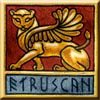
Mean is an Etruscan Goddess of fate and fame. She is an associate of the Lasas, though not necessarily one of them, though like them, She is depicted with wings. On one beautifully engraved mirror-back, Mean is shown in a scene from the Trojan War legend, with Elkhsntre (Alexandros or Paris), Elenai (Helen) who occupies the central place on the mirror, Elenai's husband Menele (Menelaos), and her brother-in-law King Akhmemnun (Agamemnon). Elenai is richly dressed and seated on a throne, with Her husband to one side; on the other side is Elkhsntre, who is mostly nude and leans on a spear. To the other side of him is Mean, who raises Her arms to crown him with a wreath. She is about as naked as one can get, except for a pair of earrings and some cute sneaker-like decorated slippers, and She is very beautifully drawn, well-proportioned and lovely. She, like Lasa Thimrae on the far right of the same register, has great wings sprouting from Her back giving Her an angelic appearance. At Her feet is a little hoofed animal, perhaps a small doe or fawn, or maybe a kind of skinny sheep, as Elkhsntre/Paris was a shepherd. The critter does seem to be with Mean, though, as it is slightly behind Her and turns to look towards Her. It is difficult to say just what the Etruscan spin on this Greek legend is, but it appears that themes of fate and love are involved. Elenai/Helen, the most beautiful woman in the world, is seated between Her husband and Her soon-to-be lover, and perhaps Mean's wreath is to show that Elkhsntre is to be awarded Elenai's love. In the legend, Paris was forced to judge who was most beautiful among three great Goddesses—Hera, Athene and Aphrodite. Each tried to influence him by offering a bribe for his vote: Hera promised him the rule of all Asia; Athene offered him victory and wisdom; and Aphrodite promised the world's most beautiful woman. He chose Aphrodite. Of course, the most beautiful woman in the world happened to already be married, hence the resulting Trojan War. The upper register of the scene on this mirror-back has Turan, the Love Goddess, Hercle (Herakles), who holds an Erote or little winged cherub, and the husband-wife couple of Tinia (Zeus), and Thalna. The presence of a couple, an Erote and the Goddess of Love do reinforce the idea that love is a central theme: perhaps Mean in the lower scene is acting as Turan's messenger or proxy. Mean is also represented on another mirror in the act of crowning Hercle as He returns from the Underworld with the tripled-headed dog Kerberos. This indicates the successful completion of His Labors, since fetching Kerberos was the twelfth and last. They are accompanied by Leinth, a death Goddess. Mean's wings and the wreaths She gives out have led Her to be equated with Nike (the Greek Goddess of victory and associated with Athena), and the act of crowning may represent bestowing fame as well as success or victory. Her name in Etruscan means "Magnificence", "Greatness", or "Glory", and She has also been identified with the Roman Victoria, victory personified. Much like Alpan, Mean seems to have survived in Tuscan folklore as a benevolent fairy or spirit called Meana, considered a love-sprite who grants favors to lovers and brides. Alternate spellings: Meian |
|
|



